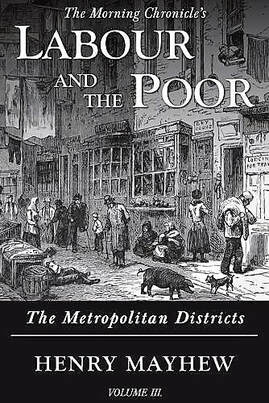Labour and the Poor
Labour and the Poor is the work of Victorian journalist, Henry Mayhew. In the 1840s, he observed, documented and described the state of working people for a series of articles in a London newspaper, the Morning Chronicle. They were later compiled into ten volumes covering the following districts: Metropolitan (4 volumes), Manufacturing, Rural (2 volumes), Wales, Birmingham and Liverpool.

To fully understand the working conditions of the English industrial working class in the mid-nineteenth century, you can do no better than open the website of Rebecca Watts and Kevin Booth: Ditto Books. In a labour of love, they have digitalised the Morning Chronicle’s series ‘Labour and the Poor’ into ten volumes, available now in paper and hardback editions as well as e-books. You can support your local independent bookstore by buying a physical book directly through them or indirectly through bookshop.org, where your nominated store will receive 10% of the purchase price (so far this has raised £1.2 million for local bookshops).
Appropriately, it was in the Morning Chronicle that Charles Dickens began publishing short stories under the pseudonym ‘Boz’. The use of the English language in those days was no less than splendid. For example, in February 1850 the Sunday Times wrote: “No one who has even casually glanced over the admirable series of letters on the state of 'Labour and the Poor in the Metropolitan, Rural, and Manufacturing Districts of England and Wales,' which have for several weeks past appeared in the columns of The Morning Chronicle, can resist the conviction that a more complete exposition of the real condition of the labouring population throughout the kingdom has never been given to the world."
Appropriately, it was in the Morning Chronicle that Charles Dickens began publishing short stories under the pseudonym ‘Boz’. The use of the English language in those days was no less than splendid. For example, in February 1850 the Sunday Times wrote: “No one who has even casually glanced over the admirable series of letters on the state of 'Labour and the Poor in the Metropolitan, Rural, and Manufacturing Districts of England and Wales,' which have for several weeks past appeared in the columns of The Morning Chronicle, can resist the conviction that a more complete exposition of the real condition of the labouring population throughout the kingdom has never been given to the world."